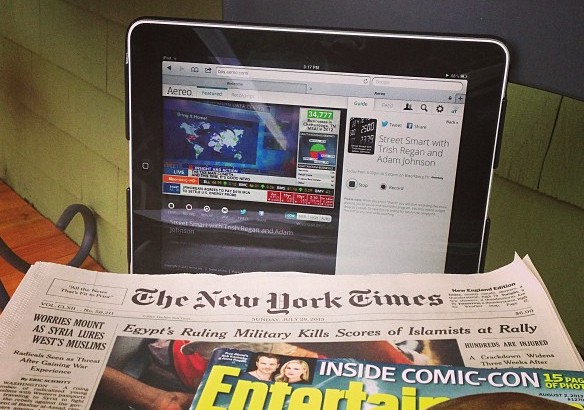
When Aereo launched its TV-over-Internet business based on tiny antennas, it drew quick legal attack from broadcasters, who have said Aereo's scheme breaks copyright laws.
But Aereo has won every key legal battle since, beating the TV companies in federal courts in New York and Boston as well as at a key appeals court—twice. Aereo has relied on the landmark 2008 Cablevision case, which ruled that use of a remote-DVR is legal and doesn't constitute a "public performance" under copyright law.
TV executives are livid over the Aereo wins and have even made outlandish claims that they may go off the air if Aereo keeps winning. In October, lawyers for the major TV networks sent a petition asking for the Supreme Court to consider the case.
Today Aereo filed its response brief (PDF), and it takes a surprising position. Usually a company that experiences a total win on appeal, as Aereo did, would want the Supreme Court to not take their case. But Aereo argued just the opposite, saying that while the decision at the 2nd Circuit was spot-on, the Supreme Court should go ahead and consider it as well.
Stop the "war of attrition"
Aereo needs a decision for two reasons. The first reason, addressed directly by the company today, is simple: TV broadcasters are going to keep waging a scorched-earth litigation campaign until they can't anymore. They have sued Aereo in five cases in three states, and there's no sign it's going to let up.
"We have decided to not oppose the broadcasters’ petition for certiorari before the United States Supreme Court," said Aereo CEO Chet Kanojia in a statement today. "Broadcasters appear determined to keep litigating the same issues against Aereo in every jurisdiction that we enter. We want this resolved on the merits rather than through a wasteful war of attrition."
A second important reason is addressed, albeit curtly, in Aereo's legal brief. The company really, really doesn't want courts to decide the issue based on a case involving its "purported competitor" FilmOn.
In its brief, Aereo explains to the court that its technology allows users to make "an individual copy of the programming... recorded to hard disk storage," similar to a home DVR. The system includes extra reproductions that aren't technologically necessary in order to adhere to copyright law.
"Even if two users choose to view the same television program at the same time—as they often will—they will never share an antenna, data stream, or digital recording," point out Aereo lawyers.
The four TV broadcasters suing Aereo—ABC, NBC, CBS, and Fox—are relying on case law that has, at times, found that even individual viewings can be considered "public performances" under copyright law. For instance, movie studios prevailed in a 1991 case that found a hotel's video-on-demand system infringed public performance rights even when viewed in private rooms. In 2011, DVD-over-Internet company Zediva was shut down with a similar line of legal reasoning.
In recent years, those large TV broadcasters have started earning large sums from cable and satellite companies that pay "retransmission fees" for carrying their content. But as much as they may want those fees, Aereo doesn't have to pay them, its lawyers argue. "Petitioners have no right to collect retransmission fees from consumers who use antennas and DVRs," states Aereo's brief.
Aereo: We are not FilmOn
Underlying Aereo's decision is the risk that a company called FilmOn—also building a TV-over-Internet business and also involved in litigation against TV companies—will interfere with its own strategy.
FilmOn is run by the eccentric Alki David, who has combined a spirited but unsuccessful legal battle with odd CBS-bashing videos and a parody site called BarryDriller.com (mocking the name of Aereo investor Barry Diller.)
In the brief, Aereo urges the court to take up this case before lawsuits regarding its "purported competitor" FilmOn result in a circuit split.
Aereo clearly doesn't want the nation's high court to consider the issue with FilmOn—which has been held in contempt for violating a court order in one of its cases—arguing in its place.
Kanojia described the issue today as a matter of consumer rights.
"Consumers have the right to use an antenna to access the over-the-air television," said Kanojia today. "It is a right that should be protected and preserved and in fact, has been protected for generations by Congress."
Listing image by stevegarfield
reader comments
82